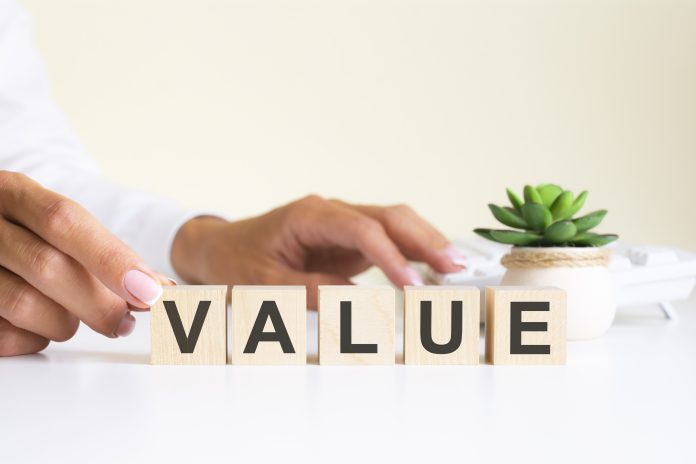
For those who are looking to buy or sell, Realtor and club broker H. Winston Hines outlines the value of, and differences between, personal goodwill, enterprise goodwill, and blue-sky value.
(NOTE: This story appears in the January 2024 issue of ED Magazine.)
O
ne of the most important and toughest discussions I have with both sellers and buyers when digging into the nitty gritty of a purchase price deals with differentiating between three approaches to “value.” How either the seller, or the buyer, looks at each one of these values will drive considerations that go into that final purchase price.
Part of this is accounting related, and as a business broker, part is how negotiations and calculations work together based on these three. I am not an accountant; but please, talk to your accountant. I am writing this to you as a business broker of adult clubs.
Goodwill generally is defined this way: “Goodwill value is an intangible value the business represents based on its historical earning power.” In short, it becomes, and is, a defendable number. I really have to harp on this definition: Goodwill is a definable, identifiable, quantifiable number. Your accountant can do this calculation and probably has done so for those of you owning a club. One thing to keep in mind is that although it is an “intangible” value, it is a very real, very identifiable number, as I will illustrate below.
But before we go to an example, there is a very important breakdown between personal goodwill and enterprise goodwill: Personal goodwill is in short that value of a business that can be attributed directly to that specific owner (or sometimes, but rarely, the GM). If the owner or manager personally is involved directly in all aspects of the club from back-office management and reporting, floor staffing, staff management, etc., these are all seen as an example of personal goodwill… and that is typically seen in the smaller, usually a solo, club or operator. All decisions and choices on a daily basis come from that person.
But here is where even a solo or small club operator can step up his (or her) operation easily, inexpensively, with solid, serious benefits in the future for the operator and the club: Start working on and building a club operations manual now. It is not that difficult to start doing. Get a three-ring notebook, start sectioning off areas of work: Door, bar, entertainers, staff management, DJ or sound management, and on and on. Start making notes even if just in long hand on each department or area of the club that requires direction, a formula, or a set of rules and procedures. With a three-ring binder you add to it as you go.
Also, if you don’t have one yet you need to have a sexual harassment procedure section should the situation arise, and most importantly, be sure to follow those rules and procedures laid down by you and your staff. The more detailed and complete the instructions and procedure are, the more that club will be valued not just on the actions of the owner, but of the operation and staff together.
The bottom line is that a club following an established operations manual is a lot easier for the owner to operate and for a buyer to want to acquire.
– Hines
That brings us to “enterprise goodwill.”
Enterprise goodwill, aka “business goodwill,” is derived from a business’ specific characteristics regardless of who operates or owns that business. Enterprise goodwill flows from an operation that can go from one owner to another easily because the buyer does not have to reinvent the wheel as the operation is self-managed. It is considered to be transferable (which is a very neat way of saying that it is more salable!). Enterprise goodwill puts the seller in a much stronger position and number from which to establish a sale price, and at the same time for the Buyer, makes that acquisition target a lot more attractive. The bottom line is that a club following an established operations manual is a lot easier for the owner to operate and for a buyer to want to acquire.
The goodwill value from the two aspects outlined above basically gets us to that calculation of “earning power.” There are all sorts of formulas and calculations that can go into those, but the key take away is a return-on-investment number (ROI): What is the percentage of net earnings (or EBITDA if you want to get fancy or are in higher multi-million-dollar gross sales) against gross sales. The buyer wants to see in simple figures how long it will take him to earn back his investment, will his cash flow cover any debt service if owner financed, what is his real, in-the-pocket return on that investment.
And now, let’s discuss that “blue sky.”
With both personal and enterprise goodwill there is a track record; there is historical accounting information, income and expense reports to give a picture of how the club has done in the past. Now the question becomes what else is there that should be considered by both the seller and of course the buyer. “Blue sky” is defined by my organization, the IBBA, as “That portion of a ‘claimed’ value or requested price that cannot be supported, or generally shown to exist, through the application of established valuation methodology. Alternatively, it is that excess value, above the business’ financial value, paid by a strategic buyer based on the buyer’s perceived future value of that business.”
Blue-sky value gets a hard knock in the above definition, because of the undocumentable nature of that value. But here is where I personally take a stand: There are certain instances and plenty more that will come up that I haven’t even seen yet that can go into a valuation that cannot be adequately or easily quantified.
“Blue sky” is defined by my organization, the IBBA, as “That portion of a ‘claimed’ value or requested price that cannot be supported, or generally shown to exist, through the application of established valuation methodology.”
– Hines
For instance, I have two clients where they have the only club in that town, a county, or an even larger area. That is not an easily calculable number, although there are algorithms and software that will do a pretty damn good job of describing the impact, or market penetration, a club could or should have in a particular market. Another example is that of what kind construction is going on around a club, which can either be a good or a bad item. If it’s a highway construction job that eats all your visibility or front parking, it may not be so good; alternatively, if that same construction job builds a turning lane specifically for the club, then it’s all good, and so on. Newspaper reports and governmental plans to drop a sports arena nearby all will help that club’s prospects now and in the future.
As an aside, after a lot of conversation and consideration, I personally do not see a casino as a bonus for a club. Casinos are after the same dollar your club is: The almighty “discretionary dollar.” I recently had a revelation in a conversation with a casino GM in a midwestern city, during which he intimated that the location of the casino was to a tiny part based on the locations of areas adult clubs. The fact that that was even a consideration was surprising.
Blue-sky value sits on top of the calculations of goodwill, on top of the value of the license if say in Pennsylvania or Florida, on top of the valuation of the FF&E (fixture furnishings & equipment). It is that number that can make or break a deal, make a deal look attractive, or out of the realm of reason. Negotiations on blue-sky value wind up becoming in large part the toughest part of a deal. No matter what the books say, it is a hard calculation a buyer makes, and a seller proposes.
There is a lot more to a deal than just what I have outlined above. I hope this is a starting point for you, and of course, holler at me with your comments.
Winston Hines, Broker in Charge of HWH Properties, is a licensed commercial Real Estate and Business Broker, specializing in the purchase and sale of adult nightclubs throughout the U.S. for almost 20 years. He is a member of the International Business Brokers Association (IBBA) and American Business Brokers Association (ABBA). He holds a Certified Business Intermediary (CBI) designation, as well as an (ABI). He can be contacted at either (864) 580-3826 or updaze@aol.com.




























